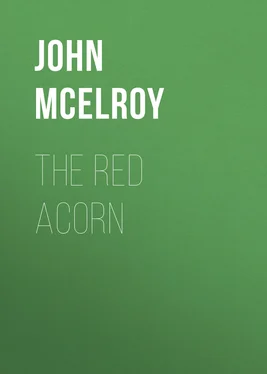John McElroy - The Red Acorn
Здесь есть возможность читать онлайн «John McElroy - The Red Acorn» — ознакомительный отрывок электронной книги совершенно бесплатно, а после прочтения отрывка купить полную версию. В некоторых случаях можно слушать аудио, скачать через торрент в формате fb2 и присутствует краткое содержание. Жанр: foreign_prose, История, foreign_edu, foreign_antique, на английском языке. Описание произведения, (предисловие) а так же отзывы посетителей доступны на портале библиотеки ЛибКат.
- Название:The Red Acorn
- Автор:
- Жанр:
- Год:неизвестен
- ISBN:нет данных
- Рейтинг книги:4 / 5. Голосов: 1
-
Избранное:Добавить в избранное
- Отзывы:
-
Ваша оценка:
- 80
- 1
- 2
- 3
- 4
- 5
The Red Acorn: краткое содержание, описание и аннотация
Предлагаем к чтению аннотацию, описание, краткое содержание или предисловие (зависит от того, что написал сам автор книги «The Red Acorn»). Если вы не нашли необходимую информацию о книге — напишите в комментариях, мы постараемся отыскать её.
The Red Acorn — читать онлайн ознакомительный отрывок
Ниже представлен текст книги, разбитый по страницам. Система сохранения места последней прочитанной страницы, позволяет с удобством читать онлайн бесплатно книгу «The Red Acorn», без необходимости каждый раз заново искать на чём Вы остановились. Поставьте закладку, и сможете в любой момент перейти на страницу, на которой закончили чтение.
Интервал:
Закладка:
Hours passed in this wrestle with pain. How many she did not know, but when she came forth it was with the composure of one who had fought the fight and won the victory, but at a cost that forbade exultation.
There was one ordeal that thus far she had not been called upon to endure. From the day on which she had donned her sable robes to that of Harry’s return no one had ventured to speak his name in her presence. Even her father and mother, after the first burst of indignation, had kept silence in pity for her suffering, and there was that in her bearing that forbade others touching upon a subject in her hearing that elsewhere was discussed with the hungry avidity of village gossips masticating a fresh scandal.
But she could not be always spared thus. She had not been so careful of the feelings of less favored women and girls, inferior to her in brightness, as to gain any claim for clement treatment now, when the displacement of a portion of her armor of superiority gave those who envied or disliked her an unprotected spot upon which to launch their irritating little darts.
All the sewing, dorcas and mite societies of the several churches in Sardis had been merged into one consolidated Lint-Scraping and Bandage-Making Union, in whose enlarged confines the waves of gossip flowed with as much more force and volume as other waves gain when the floods unite a number of small pools into one great lake.
In other days a sensational ripple starting, say in the Episcopalian “Dorcas,” was stilled into calmness ere it passed the calm and stately church boundaries. It would not do to let its existence be even suspected by the keen eyes of the freely-censorious Presbyterian dames, or the sharp-witted, agile-tongued Methodist ladies.
And, much as these latter were disposed to talk over the weaknesses and foibles of their absent sisters in the confidential environments of the Mite Society or the Sewing Circle, they were as reluctant to expose these to the invidious criticisms of the women of the other churches as if the discussed ones had been their sisters in fact, and not simply through sectarian affiliation. Church pride, if nothing else, contributed to the bridling of their tongues, and checking the free circulation of gossip.
“Them stuck-up Presbyterian and Episcopalian women think little enough on us now, the land knows,” Mrs. Deborah Pancake explained to a newly-received sister, whom she was instructing in elementary duties. “There’s no use giving ‘em more reason for looking down upon us. We may talk over each other’s short-comings among ourselves, private like, because the Bible tells us to admonish and watch over each other. But it don’t say that we’re to give outsiders any chance to speak ill of our sisters-in-Christ.”
And Mrs. Euphrosyne Pursifer remarked to the latest agreeable accession to the parish of St. Marks, with that graceful indirection that gave her the reputation in Sardis of being a feminine Talleyrand:
“Undoubtedly the ladies in these outside denominations are very worthy women, dear, but a certain circumspection seems advisable in conversing with them on subjects that we may speak of rather freely among ourselves.”
The rising fervor of the war spirit melted away most of these barriers to a free interchange of gossip. With the first thrill of pleasure at finding that patriotism had drawn together those whom the churches had long held aloof came to all the gushing impulse to cement the newly-formed relationship by confiding to each other secrets heretofore jealously guarded. Nor should be forgotten the “narrative stimulus” every one feels on gaining new listeners to old stories.
It was so graciously condescending in Mrs. Euphrosyne Pursifer to communicate to Mrs. Elizabeth Baker some few particulars in which her aristocratic associates of St. Marks had grieved her by not rising to her standard of womanly dignity and Christian duty, that Mrs. Baker in turn was only too happy to reciprocate with a similar confidence in regard to her intimate friends of Wesley Chapel.
It was this sudden lapsing of all restraint that made the waves of gossip surge like sweeping billows.
And the flotsam that appeared most frequently of late on their crests, and that was tossed most relentlessly hither and thither, was Rachel Bond’s and Harry Glen’s conduct and relations to each other.
The Consolidated Lint-scraping and Bandage-making Union was holding a regular session, and gossip was at spring-tide.
“It is certainly queer,” said Mrs. Tufis, one of her regulation smiles illuminating her very artificial countenance; “it is singular to the last degree that we don’t have Miss Rachel Bond among us. She is such a LOVELY girl. I am very, very fond of her, and her heart is thoroughly in unison with our objects. It would seem impossible for her to keep away.”
All this with the acrid sub-flavor of irony and insincerity with which an insincere woman can not help tainting even her most sincere words.
“Yes,” said Mrs. Tabitha Grimes, with a premeditated acerbity apparent even in the threading of her needle, into the eye of which she thrust the thread as if piercing the flesh of an enemy with a barb; “yes;” she pulled the thread through with a motion as if she enjoyed its rasping against the steel. “Rachel Bond started into this work quite as brash as Harry Glen started into the war. Her enthusiasm died out about as quickly as his courage, when it came to the actual business, and she found there was nobody to admire her industry, or the way she got herself up, except a parcel of married women.”
The milk of human kindness had begun to curdle in Mrs. Grimes’s bosom, at an early and now rather remote age. Years of unavailing struggle to convince Mr. Jason Grimes that more of his valuable time should be devoted to providing for the wants of his family, and less to leading the discussion on the condition of the country in the free parliament that met around the stove in the corner grocery, had carried forward this lacteal fermentation until it had converted the milky fluid into a vinegarish whey.
“Well, why not?” asked Elmira Spelter, the main grief of whose life was time’s cruel inflexibility in scoring upon her face unconcealable tallies of every one of his yearly flights over her head, “why shouldn’t she enjoy these golden days? Youth is passing, to her and to all of us, like an arrow from the bow. It’d be absurd for her to waste her time in this stuffy old place, when there are so many more attractive ones. It ought to be enough that those of us who have only a few remnants of beauty left, should devote them to this work.”
“Well,” snapped Mrs. Grimes, “your donation of good looks to the cause—even if you give all you got—will be quite modest, something on the widow’s mite order. You might easily obey the scriptural injunction, and give them with your right hand without your left knowing what was being done.”
Elmira winced under this spiteful bludgeoning, but she rallied and came back at her antagonist.
“Well, my dear,” she said quietly, “the thought often occurs to me, that one great reason why we both have been able to keep in the straight and narrow path, is the entire lack of that beauty which so often proves a snare to the feet of even the best-intentioned women.”
It was Mrs. Grimes’s turn to wince.
“A hit! a palpable hit!” laughed pretty Anna Bayne, who studied and quoted Shakespeare.
“The mention of snares reminds me,” said Mrs. Grimes, “that I, at least, did not have to spread any to catch a husband.”
“No,” returned Elmira, with irritating composure, “the poorer kinds of game are caught without taking that trouble.”
“Well”—Mrs. Grimes’s temper was rising so rapidly that she was losing her usual skill in this verbal fence—“Jason Grimes, no doubt, has his faults, as all men have; but he is certainly better than no husband at all.”
Читать дальшеИнтервал:
Закладка:
Похожие книги на «The Red Acorn»
Представляем Вашему вниманию похожие книги на «The Red Acorn» списком для выбора. Мы отобрали схожую по названию и смыслу литературу в надежде предоставить читателям больше вариантов отыскать новые, интересные, ещё непрочитанные произведения.
Обсуждение, отзывы о книге «The Red Acorn» и просто собственные мнения читателей. Оставьте ваши комментарии, напишите, что Вы думаете о произведении, его смысле или главных героях. Укажите что конкретно понравилось, а что нет, и почему Вы так считаете.












